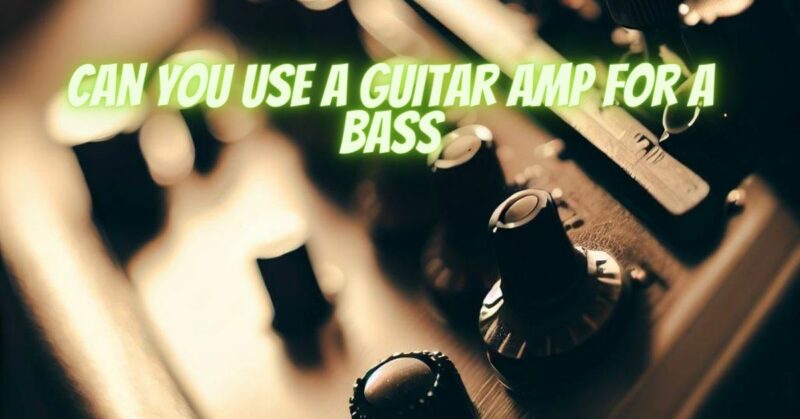In the realm of musical exploration, questions often arise about gear compatibility, especially when it comes to amplifiers. A common inquiry is whether it’s feasible to use a guitar amp for a bass. In this article, we’ll delve into the considerations, advantages, and potential pitfalls of plugging a bass into a guitar amplifier.
- Understanding the Differences:
Guitar Amps: Designed to amplify the frequencies produced by electric guitars, guitar amps are tailored to handle the midrange and high-frequency tones typical of six-string instruments. They often include features such as tone controls, gain settings, and built-in effects that enhance the specific characteristics of electric guitars.
Bass Amps: On the other hand, bass amps are purpose-built to reproduce the low frequencies generated by bass guitars. These amplifiers are equipped with larger speakers, often 10 inches or more, and are designed to handle the deep and powerful tones that emanate from bass strings. Bass amps also include specific tone-shaping controls to accommodate the unique sonic requirements of bass instruments.
- Can You Use a Guitar Amp for a Bass?
a. Technical Compatibility: Yes, it is possible to use a guitar amp for a bass, and many musicians have experimented with this setup. The technical compatibility lies in the fact that both guitars and basses output similar types of signals, typically through a standard 1/4-inch instrument cable. However, it’s essential to be aware of the potential challenges associated with this approach.
b. Cautionary Considerations: While plugging a bass into a guitar amp might work in a pinch, it’s crucial to exercise caution to avoid potential damage. Bass frequencies can push a guitar amp’s speakers to their limits, leading to distortion, speaker damage, or even amplifier overheating. Additionally, the tone controls on a guitar amp may not be optimized for the lower frequencies produced by a bass.
- Advantages of Using a Guitar Amp for a Bass:
a. Availability and Convenience: In certain situations, using a guitar amp for a bass may be a matter of convenience, especially if a bass amp is not readily available. This makeshift setup can be useful for impromptu practices or jam sessions.
b. Artistic Experimentation: Musicians often explore unconventional setups to achieve unique tones and textures. Plugging a bass into a guitar amp can result in interesting sonic characteristics, providing a platform for experimentation in recording or live performances.
c. Portability: Guitar amps are generally more compact and portable than bass amps. In situations where space and portability are critical, using a guitar amp for a bass can be a practical solution.
- Limitations and Potential Issues:
a. Speaker Limitations: Guitar amp speakers are not designed to handle the extended low frequencies produced by bass guitars. This can lead to speaker distortion, reduced clarity, and potential long-term damage to the speakers.
b. Lack of Tone Control: Guitar amps may lack the specific tone-shaping controls found on bass amps. Adjusting for the low frequencies of a bass using guitar amp controls might not yield optimal results.
c. Overloading the Amp: Bass signals can overload the preamp and power amp sections of a guitar amp, causing unwanted distortion and, in extreme cases, damaging the amplifier components.
While it is technically possible to use a guitar amp for a bass, it comes with important caveats. The limitations in speaker design, tone controls, and power handling make this setup less than ideal for regular use. In situations where a dedicated bass amp is unavailable, exercising caution, keeping the volume at moderate levels, and being mindful of potential issues can allow for temporary use without causing damage. However, for optimal performance and to preserve the integrity of both the bass and the amplifier, investing in a proper bass amp is highly recommended. Remember, musical experimentation is encouraged, but equipment care and compatibility should always be prioritized for the best sound and longevity.


